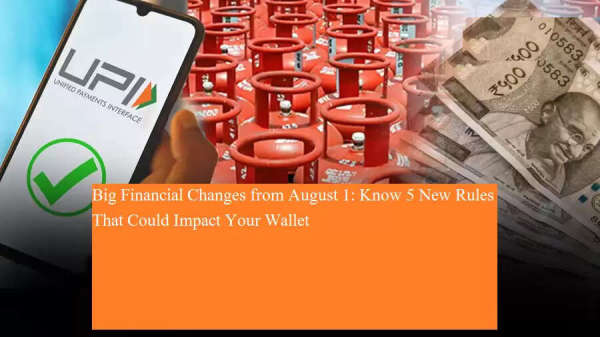
Starting August 1, 2025, several important financial rules are set to change—directly affecting your daily expenses and overall budget. These updates span across UPI transaction limits, SBI credit card insurance, LPG and gas cylinder prices, CNG and PNG rates, and possible changes in loan EMIs. Here's a breakdown of what to expect and how these changes may influence your financial planning.
From August 1, the Reserve Bank of India (RBI) is expected to revise the Unified Payments Interface (UPI) transaction limits. The move is aimed at making digital transactions smoother for high-value purchases, particularly in sectors like education and healthcare. Currently, most UPI apps allow transactions up to ₹1 lakh per day. The new limit may increase significantly, allowing for greater flexibility in cashless payments.
Impact:
This will benefit users who frequently make large digital payments, reducing dependency on net banking or debit cards for higher-value transactions.
State Bank of India (SBI) has announced changes to the insurance coverage linked to credit cards. From August 1, select credit cards will come with updated insurance terms, including travel and purchase protection. However, these benefits may now require mandatory activation or a minimum spending threshold to remain active.
Impact:
Cardholders must stay informed and check if they need to opt-in or meet new spending conditions to continue receiving insurance benefits.
LPG gas cylinder prices are typically revised on the 1st of every month, and August 1, 2025, will be no exception. With fluctuations in global crude oil prices and the dollar-rupee exchange rate, domestic LPG prices could either go up or down.
Impact:
Any change in LPG rates will directly affect household budgets, especially for middle-class families that rely heavily on subsidized cooking gas.
Like LPG, Compressed Natural Gas (CNG) and Piped Natural Gas (PNG) rates are also revised monthly by city gas distribution companies. Based on international gas prices and supply contracts, August could see an upward or downward revision.
Impact:
CNG users in metros like Delhi, Mumbai, and Ahmedabad, and households using PNG for cooking and heating should prepare for a possible price change. This affects transportation costs for CNG vehicles as well.
The RBI’s Monetary Policy Committee (MPC) is scheduled to meet in early August. Amid rising inflation and global economic pressures, there is speculation that the central bank might pause or reduce the repo rate.
Impact:
If the RBI reduces the repo rate, banks may pass on the benefit to customers through lower interest rates on home, auto, and personal loans. This could reduce your monthly EMIs, providing some much-needed financial relief to borrowers.
Stay updated with notifications from your bank and credit card provider.
Check new UPI limits and adjust payment methods accordingly.
Review your monthly budget in anticipation of fuel and gas price changes.
Consider loan refinancing or pre-payment if EMI rates become more favorable.
Track RBI announcements for any potential impact on your borrowing costs.
From digital payments to daily fuel and gas expenses, the new rules kicking in on August 1, 2025, are set to touch nearly every Indian household. Whether you're a salaried individual, a small business owner, or a student managing expenses, it's important to stay informed and plan your finances accordingly.
Keep following us for the latest updates on personal finance, government regulations, and economic trends that impact you directly.